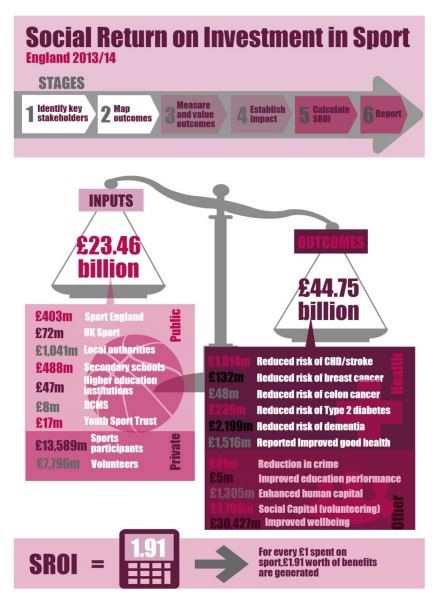Social return on investment in sport
A participation wide model for England, summary report
Samenvatting
The aim of this research is to measure the social impact of sport in England, using the Social Return on Investment framework. The purpose of the research is to enable policy makers to present a case for supporting investment in sport, by demonstrating its wider contribution and value to society.
Inputs are those things that stakeholders contribute in order to make activities possible. The inputs to the sports industry are primarily money (financial) and time (non-financial). Total inputs to sport in 2013/14 are calculated to be £23.46 billion.
Outputs are a quantitative summary of an activity. In this study, the primary output is participation in sport by the general population. The other main output is participation in sports volunteering.
Outcomes are identified through a systematic review of literature and consulting academic experts in the field of health, crime, education and social capital. Six health outcomes, two education outcomes and three other social outcomes were identified as having a strong relationship with sports participation as follows:
- Participation in sport and exercise at moderate intensity in adults reduces risk of CHD and Stroke in active men and women by an average of 30% (range 11%-52%);
- Participation in sport and exercise at moderate intensity in adults reduces risk of breast cancer in active women by 20% (range 10%-30%);
- Participation in sport and exercise at moderate intensity in adults reduces risk of developing colon cancer by 24%;
- Participation in sport and exercise at moderate intensity in adults reduces risk of Type 2 diabetes by 10%;
- Participation in sport and exercise at moderate intensity in adults reduces risk of developing dementia by 30% (range 21%-52%);
- Sports participants are 14.1% more likely to (self) report good health than nonparticipants ;
- Sports participation leads to a 1% increase in educational attainments (aged 11-18);
- Graduates who participate in sport at university earn an average of 18% more per year than their non-sporting counterparts;
- Sports participation leads to a 1% reduction in criminal incidents for males aged 10- 24 years;
- Sports participation is found to be associated with higher subjective wellbeing ;
- Volunteering is found to be associated with improved individual subjective wellbeing and greater life satisfaction;
- Volunteers create social capital to the organisations they give their time to. Volunteer time is worth at least the equivalent value of average hourly earnings. The outcomes were valued through literature, secondary data and financial proxies, sometimes with the help of assumptions.
Total outcomes from sport in 2013/14 are estimated to be £44.75 billion.

Literatuurverwijzing: Davies, L., Taylor, P., Ramchandani, G., & Christy, E. (2016). Social return on investment in sport: a participation wide model for England, summary report. Sheffield: Sport Industry Research Centre (SIRC) at Sheffield Hallam University (SHU).
